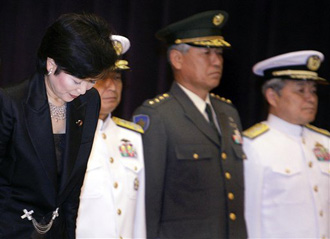Chinese Tycoon Buys Shanghai Island in Dubai
Tiger Woods Nears $1 Billion Mark with Namesake Gatorade
Japan's Smoking Rate Declines to New Low
LeBron James Comes Up Big in China for Nike, NBA
New, Bizarre Marine Life Discovered South of Philippines
Japan Builds Military Commensurate with Global Ambitions
 nternational peacekeeping is now a primary mission for Japan's military, which is also scrambling to bolster its missile defenses and deepen its coordination with U.S. troops to ensure regional security, an annual report said Friday.
nternational peacekeeping is now a primary mission for Japan's military, which is also scrambling to bolster its missile defenses and deepen its coordination with U.S. troops to ensure regional security, an annual report said Friday.
The formal shift to a focus on peacekeeping missions abroad underscores a major, continuing transformation of Japan's post World War II military from an inward-looking posture to a more ambitious, global stance that reflects Tokyo's efforts to become a more forceful player on the world stage.
It also underscores Japan's growing concern at China's expanding military might.
Japan has in recent years become more involved in peacekeeping missions, and sent several hundred troops to southern Iraq. The troops were involved in reconstruction, water-purification and other humanitarian, non-combat activities.
Japanese navy ships also provide logistical support for coalition forces engaged in Afghanistan.
According to the ``Defense of Japan 2007,'' which was approved by the Cabinet on Friday, the country will continue to increase its participation in such missions in a ``proactive'' manner.
``International peace cooperation activities are a primary mission,'' said Defense Ministry spokesman Mamoru Kotaki.
The outward emphasis is a major _ and controversial _ change in direction for Japan's military.
Though one of the world's strongest and best-equipped, Japan's Self Defense Forces are tightly constrained by the nation's 1948 constitution, which bars the use of force to settle international disputes and limits Japan's own military to a strictly defensive role.
Prime Minister Shinzo Abe, citing the threat of a nuclear-armed North Korea and the expansion and modernization of China's military, has sought to change that, championing a constitutional overhaul that would allow for a much freer hand in security policy.
| < |
Thu July 5, 2007 22:48 EDT
ERIC TALMADGE Associated Press Writer TOKYO

Yuriko Koike, Japan's newly appointed Minister of Defense, bows next to Japan's military chiefs of staff at the Defense Ministry in Tokyo on Wednesday July 4, 2007. Japan's first-ever female defense minister stepped in after her predecessor, Fumio Kyuma, resigned Tuesday over his comments suggesting the 1945 atomic bombings of Hiroshima and Nagasaki were inevitable. (AP Photo/David Guttenfelder) |
